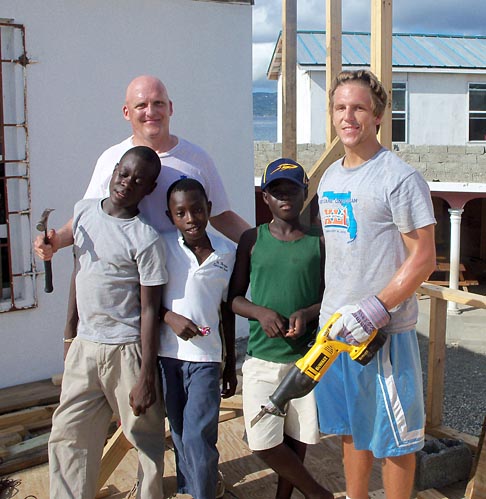On Jan. 12, 2010, a catastrophic 7.0 earthquake struck Haiti, and the country again was thrust onto the world stage with 24-7 news coverage. We were stunned by horrific scenes of death and destruction from a place that is driven in and out of our consciousness by natural and manmade disasters — famine, tropical storm, aid scandals, coup d’état or epidemic.

Dr. Clinton Longenecker and his son, Clint Jr., took a break from helping to build an orphanage in Port-de-Paix to pose for a photo with some orphaned Haitian children.
I began my Haiti “experience” as a UT MBA student in 1978 researching baseball manufacturing in the country for an international business course. I knew nothing about the country but was intrigued because of its people and rich history, being the first black republic gaining independence in 1804 and the only nation to be born out of a slave rebellion. I took my first trip to Haiti in 1983, leading a team of 35 high school and college students to construct a school in a remote village. After that summer, I left with a new appreciation for life and Haitian people. My wife, Cindy, worked in Port-au-Prince for three years in a mission school touching countless lives, and we got engaged in the capital in 1987. (People frequently ask how I was able to get Cindy to marry me; to my advantage, she had malaria, a 103-degree temperature, an infection in her eye, and the city was under martial law, which made me look pretty good on the day she said “Yes.”)
My 22-year-old son, Clint, has been to the country seven times working at an orphanage, and my daughter, Shannon, a UT junior pre-vet major, made two trips this past summer to work with a medical team and tropical veterinarian. As a family, we have learned much from Haiti, which means “the land of high mountains.” I share this background and the fact that for the past 27 years I have been making regular trips to Haiti building, working at orphanages, and conducting training programs to say that each time I leave Haiti, I do so reminded of critical life lessons worth remembering.
Here are a few learned from our time there and working side by side with Haitians: Every meal is a blessing; never take electricity for granted; life without clean water is impossible; something as simple as aspirin can save a person’s life; happiness is not based on what a person owns; doctors and dentists perform miracles every day; without soap, disease is not far away; complaining is almost always a waste of energy; necessity is the mother of invention; and contentment is a choice. Talk to anyone who has been to Haiti or any Third World country and they can share the same. When surrounded by comforts, it is a constant effort for me to integrate these lessons in my everyday life lest I forget how blessed I am.
Last summer I returned to post-earthquake Haiti and was blown away by the scope of destruction and suffering that was still playing six months later. As I traveled Port-au-Prince, I realized that Internet pictures and TV couldn’t capture the new reality of Haiti, which always has been an extremely difficult place to live, work and travel. The presidential palace and government buildings were knocked down, and the churches were in rubble. Roads, telephone poles, electricity and water systems were still in disrepair. Tent cities and temporary markets were everywhere. Schools and shops had sprung up out of the debris, and Haitians were going about their daily lives sidestepping rubble at every turn.
I was reminded of a new set of life lessons:
• Countries really can work together regardless of politics and culture when they choose to; I counted aid workers from more than 20 of the 70 different countries that stepped in to help Haiti get through the crisis;
• Individuals can and do make a difference using their talents and treasure to help others less fortunate as I met people from every walk of life pitching in;
• The Haitian people are among the strongest, most patient and resilient people in the world as they are coping with a situation that would cause many to give up;
• Leaders must lead in a time of crisis; meeting with government officials, I observed a lack of planning, organizing and action to move the country forward; and
• It is one thing to hear of more than a million homeless and another to see a mother and her four children huddled together in a tent in the rain over a charcoal fire knowing that there is nowhere to go and tomorrow will bring the same.
As we begin 2011, let us not forget the people of Haiti who survived the quake only to be hit with storms, flooding, a cholera outbreak and an uncertain future. While Haiti may not be in the headlines, the people still need our help, and we can learn great lessons from them as we take on the challenges that come with the new year.
Longenecker is the Stranahan Professor of Leadership and Organizational Excellence in the College of Business and Innovation.